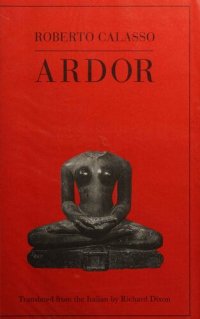
Ebook: Ardor
Author: Roberto Calasso
- Genre: Other Social Sciences // Cultural
- Tags: ardor0000cala, vedic culture, hinduism
- Year: 2014
- Publisher: Allen Lane / Penguin
- City: London
- Language: English
- pdf
"They were remote beings. Remote not only from modern man but from their ancient contemporaries. Distant not just as another culture, but as another celestial body. So distant that the point from which they are viewed becomes almost irrelevant ... they are scattered fragments of a dream whose story has been blotted out."
Little is known about the Vedic people, who lived more than 3,000 years ago in northern India: they left behind almost no objects, images or ruins. They created no empires. Only a ‘Parthenon of words’ remains: verses and formulations suggesting a daring understanding of life. In this revelatory volume, Roberto Calasso, with his signature erudition and profound sense of the past, explores the ancient texts known as the Vedas and the enigmatic web of ritual and myth that defines them. Often at odds with modern thought, these sublime texts illuminate the nature of consciousness more than anything else has up to now.
‘If the Vedic people had been asked why they did not build cities,’ writes Calasso, ‘they could have replied: we did not seek power, but rapture.’ This is the ardor of the Vedic world, a burning intensity that is always present, both in the mind and in the cosmos. Following the ‘hundred paths’ of the Satapatha Brahma’a, an impressive exegesis of Vedic ritual, Ardor shows that it may be possible to reach what is closest by passing through that which is most remote. In Calasso’s words, ‘the whole of Vedic India was an attempt to think further.’
ROBERTO CALASSO is the publisher of Adelphi Edizioni in Milan and the author of many books. Ardor is the seventh part of a work in progress, following 'The Ruin of Kasch', 'The Marriage of Cadmus and Harmony', 'Ka', 'K.', 'Tiepolo Pink', and 'La Folie Baudelaire'.
Little is known about the Vedic people, who lived more than 3,000 years ago in northern India: they left behind almost no objects, images or ruins. They created no empires. Only a ‘Parthenon of words’ remains: verses and formulations suggesting a daring understanding of life. In this revelatory volume, Roberto Calasso, with his signature erudition and profound sense of the past, explores the ancient texts known as the Vedas and the enigmatic web of ritual and myth that defines them. Often at odds with modern thought, these sublime texts illuminate the nature of consciousness more than anything else has up to now.
‘If the Vedic people had been asked why they did not build cities,’ writes Calasso, ‘they could have replied: we did not seek power, but rapture.’ This is the ardor of the Vedic world, a burning intensity that is always present, both in the mind and in the cosmos. Following the ‘hundred paths’ of the Satapatha Brahma’a, an impressive exegesis of Vedic ritual, Ardor shows that it may be possible to reach what is closest by passing through that which is most remote. In Calasso’s words, ‘the whole of Vedic India was an attempt to think further.’
ROBERTO CALASSO is the publisher of Adelphi Edizioni in Milan and the author of many books. Ardor is the seventh part of a work in progress, following 'The Ruin of Kasch', 'The Marriage of Cadmus and Harmony', 'Ka', 'K.', 'Tiepolo Pink', and 'La Folie Baudelaire'.
Download the book Ardor for free or read online
Continue reading on any device:

Last viewed books
Related books
{related-news}
Comments (0)